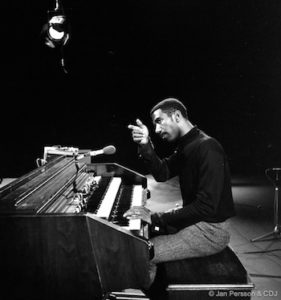
Jimmy Smith
Jimmy Smith, a Black jazz musician, was born on this date in 1928.
He was born James Oscar Smith in Norristown, PA, near Philadelphia. His mother played the organ in a local church, and his father was a tap dancer and a musician. Smith began playing piano for his father’s act at an early age. When he was 14, Smith enlisted in the Navy, playing the piano and the bass in the segregated army band. After a few years in the service, Smith moved back to Philadelphia, where he worked construction and on the Pennsylvania Railroad to make ends meet.
He pursued a musical career when he saw "Wild Bill Davis" perform on the organ. Soon after that night, Smith bought a Hammond B-3 organ and a big Leslie speaker. After four months of intense practice, he came out swinging. Energetic hard bop, blues, and the sound of the church also infused his style. Smith’s reputation grew, and the Hammond organ became a legitimate jazz instrument.
In 1956, Smith took his music to New York. Successful performances helped him get signed by Blue Note Records. He began his recording career with a trio album called "A New Sound, A New Star," by the end of the 1950s, he was one of the busiest artists on the label. He often developed a significant following when working with saxophonist Stanley Turrentine, guitarist Kenny Burrell, and drummer David Bailey.
In 1962, Smith signed with Verve Records and began working with larger ensembles with arranger and composer Oliver Nelson using many of his orchestrations. He also wrote themes for movies such as "Goldfinger" and “The Carpetbaggers" and worked with guitarist Wes Montgomery.
During the 1970s and early ‘80s, Smith opened a nightclub in Los Angeles with his wife, Lola. His career spanned over 40 years, and his musical influence is still felt. His soulful, rhythmic, and booming sound on the Hammond B-3 organ created a space for a new generation of jazz organists and other instrumentalists.
Smith lived in Sacramento, occasionally doing a concert or a recording session. He died on February 8, 2005.
A Century of Jazz, by Roy Carr
Da Capo Press, New York
Copyright 1997
ISBN 0-306-80778-5